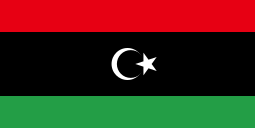Presidential Council (Libya)
The Presidential Council of Libya (Arabic: المجلس الرئاسي) is a body formed under the terms of the Libyan Political Agreement which was signed on 17 December 2015. The Council carries out the functions of head of state of Libya [1] and is to take command of the Libyan National Army. The agreement has been unanimously endorsed by the United Nations Security Council which welcomed the formation of the Presidency Council and recognized that the Government of National Accord is the sole legitimate executive government of Libya. The Presidential Council presides over the Government of National Accord.[2]
| Agency overview | |
|---|---|
| Formed | 2016 |
| Jurisdiction | Libya |
| Headquarters | Al-Sikka Tripoli, Libya |
| Minister responsible |
|
 |
|---|
| This article is part of a series on the politics and government of Libya |
|
|
|
Legislature
|
|
Judiciary
|
|
|
|
History
Since 2014, two governments, one in Tripoli and one in Tobruk, have vied for power. The government in Tobruk was recognized by the international community prior to the formation of the Presidential Council.[3]
Structure
The Presidential Council has nine members and its proceedings are led by a President supported by five Vice Presidents and three Ministers, one drawn from different constituencies and different ministries, respectively.[4][5] Any decision taken by the Council must be approved unanimously by its President and all its Vice Presidents.[5]
Location
The Chairman of the Presidential, Fayez al-Sarraj (former member of the Tobruk parliament), and seven of the council's other members arrived in Tripoli on 30 March 2016 at the Abu Sittah naval base.[3][6] The following day, it was reported that the GNA has taken control of the prime ministerial offices and that the rival National Salvation Government appointed prime minister Khalifa al-Ghawi had fled to Misrata. On April 5, the National Salvation Government announced that it was resigning, "ceasing operations," and ceding power to the Presidential Council.[7][8][9]
List of Members
As of 30 March 2016, the members of the council were:[10]
| Incumbent | Office | Since | Until | Constituency |
|---|---|---|---|---|
| Fayez al-Sarraj | President of the Presidential Council | 30 March 2016 | GNA | |
| Musa Al-Koni | Vice President of the Presidential Council | 30 March 2016 | 2 January 2017[11] | Southern Libya |
| Fathi Al-Majbari | Vice President of the Presidential Council | 30 March 2016 | 18 July 2018 | GNA |
| Abdulsalam Kajman | Vice President of the Presidential Council | 30 March 2016 | Muslim Brotherhood | |
| Ahmed Maiteeq[12] | Vice President of the Presidential Council | 30 March 2016 | Misrata and GNA | |
| Ali Faraj Qatrani | Vice President of the Presidential Council | 30 March 2016 | 8 April 2019[13] | Eastern Libya / LNA |
| Omar Al-Aswad | Minister | 30 March 2016 | Zintan and Western Libya | |
| Ahmad Hamza Al-Mahdi | Minister | 30 March 2016 | ||
| Mohammed Ammari | Minister | 30 March 2016 | GNC |
References
- "As Libya marks 64th independence anniversary, UN envoy urges unity behind new Government". United Nations. December 24, 2015. Archived from the original on January 27, 2016. Retrieved November 6, 2016.
- "Unanimously Adopting Resolution 2259 (2015), Security Council Welcomes Signing of Libyan Political Agreement on New Government for Strife-Torn Country". United Nations. December 23, 2015. Archived from the original on January 30, 2016. Retrieved November 7, 2016.
- "A Quick Guide to Libya's Main Players". European Council on Foreign Relations. Archived from the original on October 25, 2016. Retrieved November 7, 2016.
- "UN proposes unity government to end Libya conflict". Al Jazeera. October 8, 2015. Archived from the original on June 5, 2016. Retrieved November 7, 2016.
- Article 1.3 of the Libyan Political Agreement. 2015.
- "Support grows for Libya's new unity government". AFP. April 1, 2016. Retrieved November 7, 2016.
- "Libya's Tripoli Government Says Will 'Cease Operations'". ABC News. April 5, 2016. Archived from the original on April 6, 2016. Retrieved 2016-04-05.
- "Tripoli authorities cede power to Libyan unity government: statement". Yahoo! New Zealand. April 5, 2016. Archived from the original on April 15, 2016. Retrieved April 5, 2016.
- Ayyab, Saber (March 31, 2016). "Rebel Tripoli administration vanishes". Archived from the original on April 10, 2016. Retrieved April 3, 2016.
- "Presidential Council to Be". Archived from the original on 2019-05-19. Retrieved 2016-04-07.
- Musa, Rami (2 January 2017). Libyan presidential council resigns, citing failure Archived 2019-06-21 at the Wayback Machine. AP.
- "Libya: Ahmed Maiteeq Hails Algeria's 'Support' to Political Dialogue in Libya". All Africa. Archived from the original on 2016-04-10. Retrieved 2016-04-01.
- "Sarraj Deputy Quits, Voices Support for Libyan National Army". Asharq AL-awsat. Archived from the original on 2019-09-10. Retrieved 2019-04-08.
